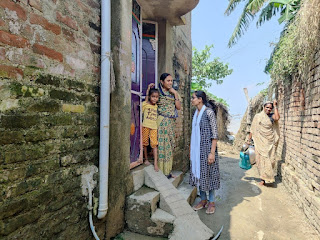An edu-leader from Batch 4, Juhi comes from a small village called Daulatpur in Jamui district, Bihar. She is the younger one between two daughters in the family and has two brothers too. Juhi has high aspirations and does not want to settle for less by getting married like her elder sister.
Juhi came to know about the fellowship
from the JEEViKA office in her village. The Government of Bihar, through the
Bihar Rural Livelihoods Promotion Society, an autonomous body under the
Department of Rural Development, is spearheading the World Bank-aided Bihar
Rural Livelihoods Projects, locally known as JEEViKA, with an objective of
social and economic empowerment of the rural poor.
One of the reasons for Juhi to join the
fellowship was attaining community leadership by educating children – she wants
to empower herself first before empowering women from the marginalized
sections. She knows how difficult it is to get permission to study in high
school as a young girl in her village. However, times are changing now. If one
girl from family studies till high school, there is a high probability that all
the girls from the same family will study till high school. Generally, higher
education has never been a priority in this community, especially for girls,
but now girls are studying further. This shift has been primarily because the
girls studying in high school are acting as role models for other girls in
primary and middle schools.
Juhi taught at the Naveen Prathmik
Vidyalaya, Taantitola in Jamui district, Bihar, during her fellowship.
Headmaster Suryakant Prabhakar feels that her presence in school led to an
increase in the number of enrolments and students’ attendance – from 4 to 45 students in classes 1 to 5. Juhi
would visit the nearby children’s homes daily to bring them to school. During
the community visit, it was a matter of pride when the mother of a student,
Priti, shared that Priti was also studying at home on her own – this is when
Juhi used to teach her how to count with the heap of stones.
A group of students learning how to
count with the help of stones
Juhi believes that the fellowship
helped her stay motivated even during difficult situations, such as pandemic
lockdowns. When Covid-19 appeared, she along with others was equally disturbed
and feared it. However, her continuous engagement, both virtual and physical,
with the community and its children, in the form of helping people in need and
providing medical and essential commodities to them, gave a boost to her
energy.
Earlier, Juhi was a shy and introverted person who
had to wait for her brother to accompany her to go from one place to another.
Her mother Sunita Devi shared that Juhi was a careless girl who did not pay
attention to small tasks assigned to her. Now, she has become more responsible.
She makes her own decisions and freely goes wherever she wants – she just tells
her mother where she is going and that’s it! She also knows all the alternative
paths to reach a location.
Juhi feels that because of the
i-Saksham fellowship, she has been able to support rural women, especially concerning
their health and hygiene. Juhi continues to work on her goals and aspirations.
Once she completed her fellowship, she joined Sukhibhava – an organization
working with urban poor and rural communities across India to end menstrual
stigma and improve menstrual hygiene practices, sexual reproductive
health-seeking behavior, and mobility of women and girls. Her role is to
inquire about the health and hygiene of rural women daily and provide solutions
and prescriptions for them in consultation with doctors. Nowadays, she is going
to 4 panchayats (comprising 24 villages) and traveling regularly to these
places for her work. She is confident that she can take any responsibility now.
While working, Juhi is also preparing
for Bihar police examinations and wants to be a part of law and order.
Student’s mothers learning writing
their names with the help of Teaching-learning-material (TLMs)
Juhi (in left) talking to a lady
(right) during her community visit
Even in her current job, Juhi has carved a niche for herself. Pooja, a girl who has been teaching children for the past three years, is the daughter of one of the beneficiaries of Juhi’s current job. She shared how Juhi continuously helps them connect with doctors virtually as her mother needs guided prescriptions.












